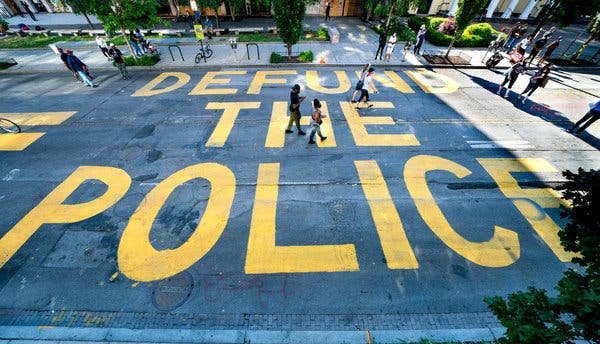By Henry Demarest
As you likely know, protests for racial equality and specifically an end to police brutality of African Americans are sweeping the nation. Ignited by the cruel murder of George Floyd by a police officer, they have been largely peaceful yet have displayed a fury of both black and white Americans at the inequality of the “system.” To express this anger, many controversial slogans have popped up within these protests, yet they have also been used to anger those who oppose the protesters and the reforms for which they are protesting.
One of these slogans that has been getting a considerable amount of attention because of these protests is “Defund the Police” a chant that has so permeated this movement that it has been painted across a street in Washington D.C.. It has also elicited cries of outrage and fear from right wing media which sees it as proof of anarchical tendencies within the Black Lives Matter movement.
The problem is, however, that “Defund the Police” does not describe creating anarchy and abolishing police. If that were the case, I would certainly not support the slogan either as I believe that there is still a place for law enforcement in our society. But, once again, this is not what it means.
In fact, “Defund the Police” simply calls upon local governments to reinvest funds that go to police departments into other social services, such as child care, mental health assistance, drug issues, healthcare, and more. This reinvestment would decrease the responsibilities given to police officers and make it easier for them to simply be the community protectors that they should. It would also help fix problems such as the criminalization of drug addiction and mental illness by putting these people into a system that will truly help them instead of putting them into a prison cell with murderers.
Additionally, reducing the funding of police departments can mitigate the dramatic militarization of our nation’s police. This militarization has only been further revealed by the police response to protests as tear gas, riot armor, and even tanks were all turned on protesters. Why does local law enforcement need tanks? By equipping police officers with the weaponry of a soldier, our society communicates to them that they are soldiers, fighting a war against the people of their own communities.
The most confident I have felt in police while watching the protesters on TV was when I watched a group of bike cops watching a group of peaceful protesters to ensure nothing got out of hand. There were no batons, no riot shields, no tanks, no tear gas, nothing. Just some people in bright vests sitting on bikes. That’s what I would like most of our police officers to look like, without any military-grade vehicles, weaponry, or armor. I sincerely believe that this is how we create police departments that truly help their communities rather than being at war with them.
And I know the question that comes next, “but what if something terrible happens – won’t they want that weaponry?” And, I agree, they should be prepared, but this massive militarization is simply unnecessary. What if we just had one SWAT team, but otherwise police officers don’t need guns or at least military-grade ones? That’s the case in England and they seem okay… A militaristic arms race between police and theoretical criminals only leads to an overly powerful police department.
So, this is why I say that we should support the policy of “Defunding the Police.” If you don’t wish to use the slogan (like Democratic candidate Joe Biden), I at least hope that you will support this reinvestment in social services and this decrease in the militarization of our police departments. And at the very least, I hope that you call out right wing media for falsely characterizing the slogan to inspire division and a fear of reform. This could be a time of great unity and social progress in our nation, and we can’t let a misunderstanding ruin that enormous potential.






Be First to Comment